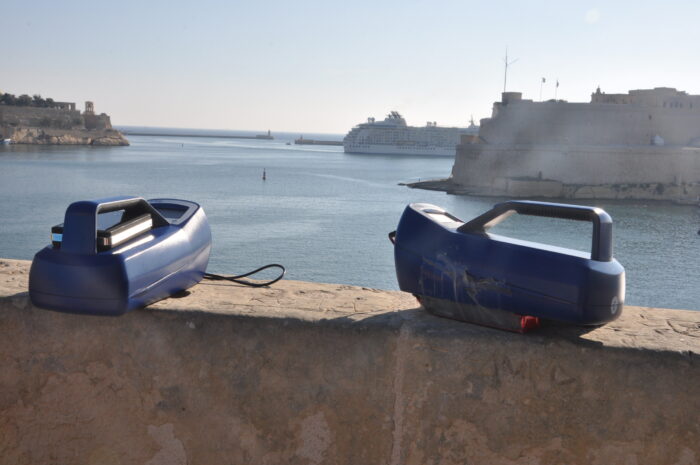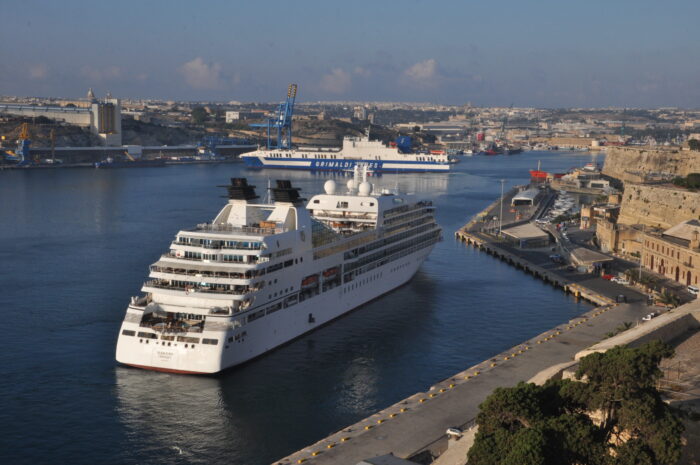BirdLife Malta welcomes the news that the Government will be investing €50 million in a project which will enable cruise liners to be supplied shore power while berthed in the Grand Harbour, a step in the right direction which will bring evident benefits in terms of air quality to all those residing in the area. We have more reasons to welcome this positive news since BirdLife Malta has been for the past years at the forefront of an awareness campaign calling for the reduction of air pollution generated by ships in the Mediterranean.
Now, thanks to the Grand Harbour Clean Air Project announced yesterday by Minister Ian Borg, the installation of shore-to-ship power infrastructure in Valletta will allow cruise ships to switch off their engines and plug in to shore electricity points, thus drastically reducing emissions over the Grand Harbour area and beyond.
BirdLife Malta’s advocacy efforts rewarded, we now call on Government to support and lobby for an ECA in the Mediterranean
Through the Together against Air Pollution from Ships project launched in December 2016, BirdLife Malta has been working with various Mediterranean partners and enviromental NGOs in this important area. Having shore-to-ship power to cut on harbour ship emissions was one of the solutions suggested by this project, together with the establishment of an Emission Control Area (ECA) in the Mediterranean basin. An ECA is a declared area at sea in which stricter controls are imposed to minimise airborne emissions from ships.
It is estimated that shipping emissions cause 50,000 premature deaths per year in Europe and cost €60 billion just in health costs per year in the European Union. Around 44,000 workdays are lost each year due to sickness leave related to air pollution according to the latest EU statistics. However a French study published last year showed that an ECA in the Mediterranean could potentially save 6,000 lives each year and would bring up to €14 billion in reduced health costs.
We are glad to finally see some of our recommendations becoming a reality, and now look forward to the Government going a step further to declare its support to the efforts being undertaken on an international level for an ECA to be established in our region. Whilst Spain, France and Italy have already voted in favour, Malta has to date not declared its support to this measure, despite having the largest registered fleet at International Maritime Organisation (IMO) level. The Maltese Government could therefore be instrumental in changing the tide at even a Mediterranean level using Malta’s central and influential position to lobby other Mediterranean countries to support the designation of the Mediterranean Sea as an ECA.
The positive initiative Goverment launched yesterday rewards BirdLife Malta’s effective advocacy efforts in this regard, and goes to show how we managed to highlight the environmental, health and financial benefits such an important step will bring for the population. If only the relevant authorities heeded all our proposals, Malta and Gozo would be a much better place!
Read the Maltese version of the press release here.

Note about the Mediterranean ECA
Cruise liners entering an ECA (such as a SECA, Sulphur Emission Control Area are obliged to switch to cleaner fuel and limit their maximum sulphur content of fuel oils to 0.1% in comparison to outside ECA where a limit of 0.5% is established. There are four existing ECAs: the Baltic Sea, the North Sea, the North American ECA and the US Caribbean ECA. The establishment of an ECA in the Mediterranean is the long-term goal of the “Together against Air Pollution from Ships” project for which BirdLife Malta has partnered with various Mediterranean enviromental NGOs from Italy, Spain and France and our BirdLife partners NABU (BirdLife Germany) and Ornithologiki (BirdLife Greece) to deliver an awareness campaign on air pollution generated by cruise ships in the Mediterranean. An air quality measurement exercise we had carried out at the Valletta Grand Harbour in 2018 had shown high concentrations of ultrafine particles and NO₂ in the presence of cruise liners, passing by and berthing in the port.

